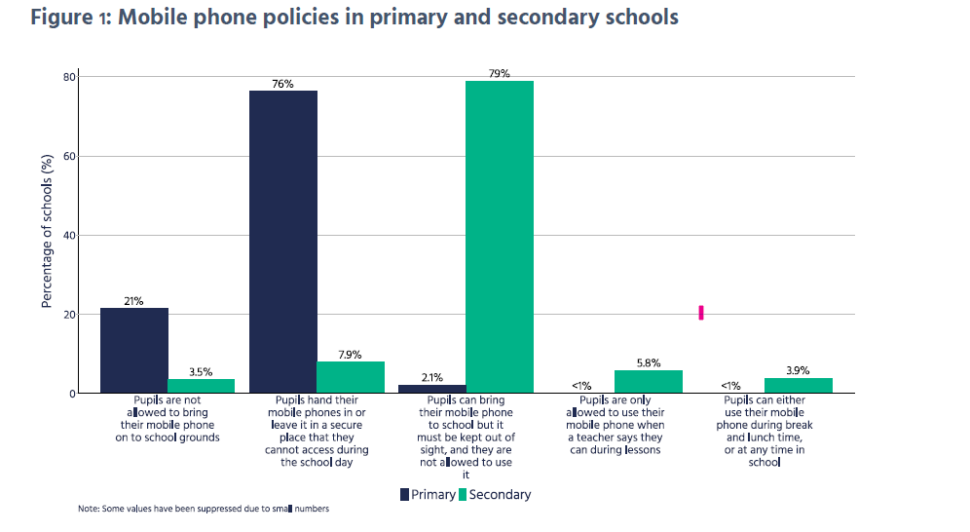Almost all schools restrict phones as mandated by government, but online safety remains a top issue cited by leaders, a major new survey by the Children’s Commissioner has found.
Yet the study found just 3.5% of secondary schools are imposing total mobile phone bans.
The Children’s Commissioner’s School and College Survey, published on Thursday, gathered results from nearly 19,000 schools and colleges in England.
It revealed 90% of secondary schools and 99.8% of primary schools already have policies in place that stop the use of mobile phones during the school day, in line with DfE non-statutory guidance.
But the majority (79%) of secondaries allow pupils to bring phones to school if they keep them out of sight and do not use them.

Meanwhile 7.9% of secondaries require pupils to hand in their phones during schooltime, while around 10% allow pupils to use their phones at some points of the day, such as breaks and lunchtime.
The survey found secondary schools reporting higher concerns about behaviour tended to enforce stricter phone policies, while concerns about online safety did not appear to influence strictness in the same way.
Meanwhile one in five primaries (21%) ban phones altogether, while 76% make pupils hand in phones. Just 2.1% of primaries allow pupils to bring in phones, as long as they are not used.
Exceptions are also made for children with additional needs, at 66% of secondary schools and 26% of primary schools.
Safety remains top concern
Yet the survey found online safety was among the most cited issue of concern for school leaders for children in their communities, second only to mental health services.
Children’s Commissioner Dame Rachel De Souza said safety remains “one of [leaders’] biggest worries…because they know that banning phones during school hours will not keep those same children safe when they go home for the day”.

YouGov polling carried out last month found 23 per cent of children aged eight to 15 spend more than four hours a day on devices with internet access such as computers, smartphones or gaming consoles. Another 25 per cent spend two to three hours a day on such devices.
Previous research by the Children’s Commissioner found 45% of children aged between eight and 17 had seen or experienced harmful content online, including anonymous trolling, sexualised, violent or gory content and pornography.
Schools just part of solution
De Souza stressed the onus also rests with tech firms and parents.
“We need to get serious about regulating what [childre can see, where they see it and curbing the damage currently being wreaked on their health, attention span and safety by tech companies enjoying unlimited freedoms while refusing to take responsibility for the people on their platforms,” she said.
Meanwhile parents must feel confident putting age-appropriate boundaries in place for children using the internet, and “talking at home about what they see [online] and how to respond.”
Following calls for government to impose blanket phone bans at schools, de Souza said she believes banning decisions should always come from headteachers, “not a direction imposed nationally by the government”.
But she called on the government to be “ambitious and far-reaching” as it implements the Online Safety Act. “It must deliver on its full potential – holding technology companies to account and making the digital world a safer place for children by design,” she said.
Schools taking action
Headteacher Kirsty Rogers operates a strict phone policy at Aureus School, a mixed secondary in Didcot, Oxfordshire, which has had a positive impact on behaviour and attendance.
She is now working to encourage parents not to buy smartphones for their children.
Rogers says that by the time pupils get to secondary school many children “have already had their phones since year five, year six”.
After Easter, she plans to run a parents evening showing “stark” figures about what children are seeing on social media, to highlight the risks to children.
“We’re targeting the primary school [parents] and basically saying, you know, do you actually think they should have this unrestricted access? Should your child be in their bedroom scrolling through social media? And the answer is, they shouldn’t at that age, because you can’t protect them from it. Therefore, you’ve got to teach them about it.
“My goal is absolutely we should be pushing parents not to buy smartphones. We should be saying, buy them a brick phone, essentially, until they’re 14 at the very least. And that’s what we’re aiming for now, for 2026.”








Your thoughts